Business
The striking Swedish workers taking on carmaker Tesla
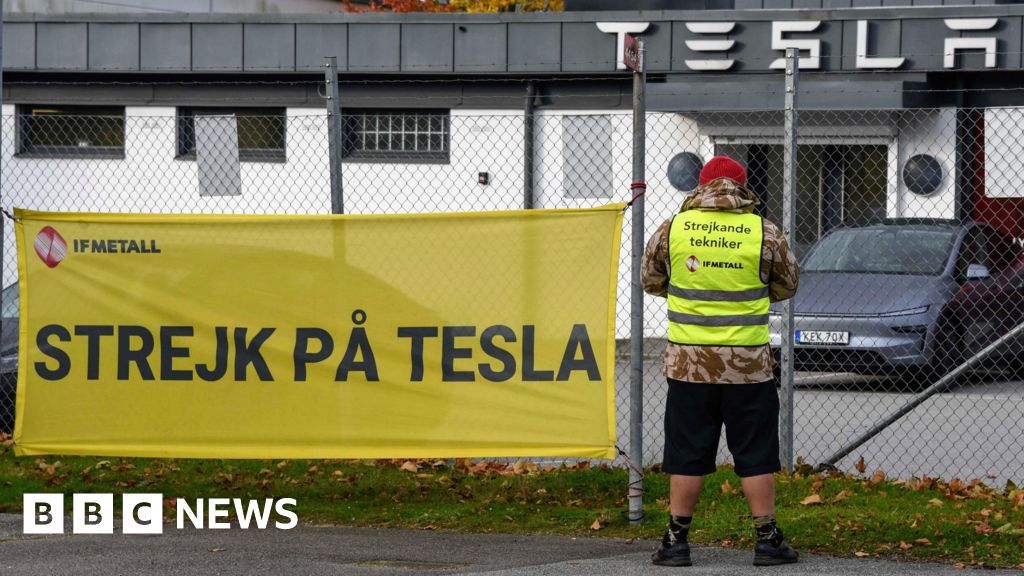
Tim ManselBusiness reporter, Malmö, Sweden
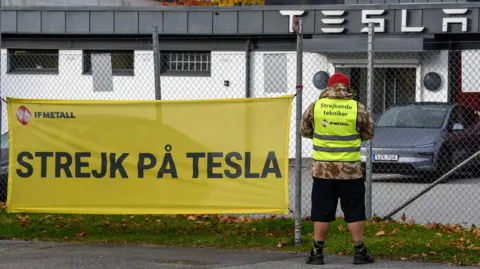 BBC
BBCIn Sweden 70 car mechanics are continuing to take on one of the world’s richest companies – Tesla. The strike at the US carmaker’s 10 Swedish service centres has now reached its second anniversary, and there is little prospect of a resolution.
Janis Kuzma has been on the Tesla picket line since October 2023.
“It’s a tough time,” says the 39-year-old. And as Sweden’s cold winter weather sets in, it’s likely to become tougher.
Janis spends each Monday with a colleague, standing outside a Tesla garage on an industrial park in Malmö. His union, IF Metall, provides accommodation in the form of a mobile builders’ van, as well as coffee and sandwiches.
But it’s business as usual across the road, where the workshop appears to be in full swing.
The strike concerns an issue that goes to the heart of Swedish industrial culture – the right of trade unions to negotiate pay and conditions on behalf of their members. This concept of collective agreement has underpinned industrial relations in Sweden for nearly a century.

Today some 70% of Swedish workers are members of a trade union, and 90% are covered by a collective agreement. Strikes in Sweden are rare.
It’s an arrangement welcomed across the board. “We prefer the right to negotiate freely with the unions and sign collective agreements,” says Mattias Dahl of the Confederation of Swedish Enterprise business organisation.
But Tesla has upset the apple cart. Outspoken chief executive Elon Musk has said he “disagrees” with the idea of unions. “I just don’t like anything which creates a kind of lords and peasants sort of thing,” he told an audience in New York in 2023. “I think the unions try to create negativity in a company.”
Tesla came to Sweden back in 2014, and IF Metall has long wanted to secure a collective agreement with the company.
“But they wouldn’t respond,” says Marie Nilsson, the union’s president. “And we got the impression that they tried to hide away or not discuss this with us.”
She says the union eventually saw no other option than to announce a strike, which started on 27 October, 2023. “Usually it’s enough to make the threat,” says Ms Nilsson. “The company usually signs the agreement.”
But not in this case.

Janis Kuzma, who is originally from Latvia, started working for Tesla in 2021. He claims that pay and conditions were often dependent on the whim of managers.
He recalls a performance review at which he says he was refused an annual pay rise because he was “not reaching Tesla’s goals”. Meanwhile, a colleague was said to have been turned down for a pay rise because he had the “wrong attitude”.
However, not everyone went out on strike. Tesla had some 130 mechanics working at the time the industrial action was called. IF Metall says that today around 70 of its members are on strike.
Tesla has long since replaced these with new workers, for which there is no precedent since the 1930s.
“Tesla has done it [found replacement staff] openly and systematically,” says German Bender, a researcher at Arena Idé, a think tank financed by Swedish trade unions.
“It’s not illegal, which is important to understand. But it goes against all established norms. But Tesla doesn’t care about norms.
“They want to be norm breakers. So if somebody tells them, hey, you are breaking a norm, they see that as a compliment.”
The BBC asked to speak to Tesla’s subsidiary, TM Sweden, but the request was declined in an email citing “all-time high deliveries”.
Indeed, the company has given only one media interview in the two years since the strike began.
In March 2024, TM Sweden’s “country lead”, Jens Stark, told the business paper Dagens Industri that it suited the company better not to have a collective agreement, and instead “to work closely with the team and give them the best possible conditions”.
Mr Stark denied that the decision not to enter a collective agreement was one made at Tesla headquarter in the US. “We have a mandate to make our own such decisions,” he said.
IF Metall is not entirely alone in its fight. The strike has been supported by a number of other unions.
Dockworkers in neighbouring Denmark, Norway and Finland, are refusing to handle Teslas; rubbish is no longer collected from Tesla’s Swedish facilities; and newly built charging stations are not being connected to the grid in the country.
There is one such facility near Stockholm Arlanda Airport, where 20 chargers stand idle. But Tibor Blomhäll, the president of enthusiasts group Tesla Club Sweden, says Tesla owners are unaffected by the strike.
“There’s another charging station 10km (six miles) from here,” he says. “And we can still buy our cars, we can service our cars, we can charge our cars.”
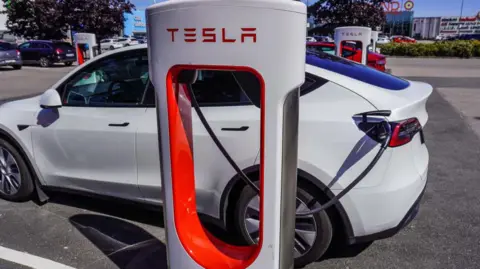 AFP via Getty Images
AFP via Getty ImagesWith stakes high on both sides, it’s hard to see an end to the stand-off. IF Metall risks setting a precedent if it concedes the principle of collective agreement.
“The concern is that that would spread,” says Mr Bender, “and eventually erode the strong support for the labour market model that we have among employers as well”.
Tesla, on the other hand, may feel that conceding this fight in Sweden would strengthen the hand of those who want to unionise Tesla at its production facilities in the US and Germany, where it employs tens of thousands of staff.
Mr Bender detects another reason for the position Tesla has taken. “I think it’s important to understand that Elon Musk doesn’t want to be sort of told how to do things,” he says.
“And I think he doesn’t view the industrial action that the union has taken as an invitation to negotiate, but rather as an ultimatum to sign a dotted line that he doesn’t want to sign.”
Mr Blomhäll of Tesla Club Sweden also says he sees no quick solution. “This will be another Korean War,” he says. “A conflict that just drags on.”
Business
New Income Tax Act 2025 to come into effect from April 1, key reliefs announced in Budget 2026

New Delhi: Finance Minister Nirmala Sitharaman on Sunday said that the Income Tax Act 2025 will come into effect from April 1, 2026, and the I-T forms have been redesigned such that ordinary citizens can comply without difficulty for ease of living.
The new measures include exemption on insurance interest awards, nil deduction certificates for small taxpayers, and extension of the ITR filing deadline for non-audit cases to August 31.
Individuals with ITR 1 and ITR 2 will continue to file I-T returns till July 31.
“In July 2024, I announced a comprehensive review of the Income Tax Act 1961. This was completed in record time, and the Income Tax Act 2025 will come into effect from April 1, 2026. The forms have been redesigned such that ordinary citizens can comply without difficulty, for) ease of living,” she said while presenting the Budget 2026-27
In a move that directly eases cash-flow pressure on individuals making overseas payments, the Union Budget announced lower tax collection at source across key categories.
“I propose to reduce the TCS rate on the sale of overseas tour programme packages from the current 5 per cent and 20 per cent to 2 per cent without any stipulation of amount. I propose to reduce the TCS rate for pursuing education and for medical purposes from 5 per cent to 2 per cent,” said Sitharaman.
She clarified withholding on services, adding that “supply of manpower services is proposed to be specifically brought within the ambit of payment contractors for the purpose of TDS to avoid ambiguity”.
“Thus, TDS on these services will be at the rate of either 1 per cent or 2 per cent only,” she mentioned during her Budget speech.
The Budget also proposes a tax holiday for foreign cloud companies using data centres in India till 2047.
Business
Budget 2026 Live Updates: TCS On Overseas Tour Packages Slashed To 2%; TDS On Education LRS Eased
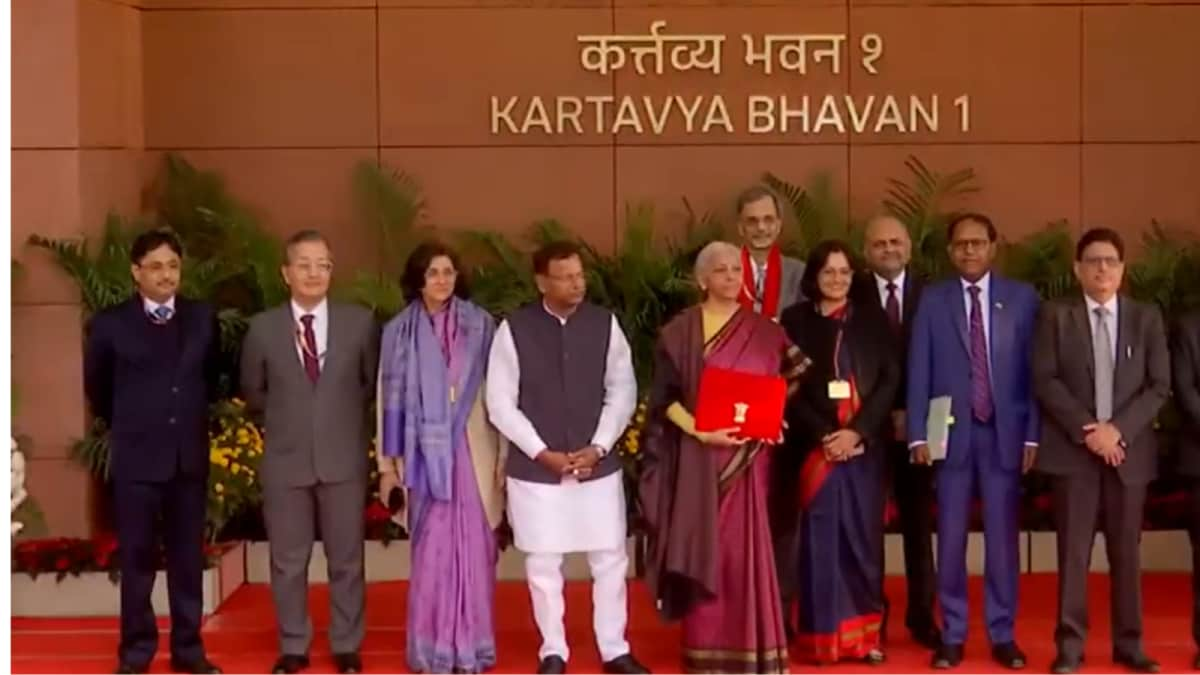
Union Budget 2026 Live Updates: Union Budget 2026 Live Updates: Finance Minister Nirmala Sitharaman is presenting the Union Budget 2026-27 in Parliament, her record ninth budget speech. During her Budget Speech, the FM will detail budgetary allocations and revenue projections for the upcoming financial year 2026-27. Sitharaman is notably dressed in a Kanjeevaram Silk saree, a nod to the traditional weaving sector in poll-bound Tamil Nadu.
The budget comes at a time when there is geopolitical turmoil, economic volatility and trade war. Different sectors are looking to get some support with new measures and relaxations ahead of the budget, especially export-oriented industries, which have borne the brunt of the higher US tariffs being imposed last year by the Trump administration.
On January 29, 2026, Sitharaman tabled the Economic Survey 2025-26, a comprehensive snapshot of the country’s macro-economic situation, in Parliament, setting the stage for the budget and showing the government’s roadmap. The survey projected that India’s economy is expected to grow 6.8%-7.2% in FY27, underscoring resilience even as global economic uncertainty persists.
Budget 2026 Expectations
Expectations across key sectors are taking shape as stakeholders look to the Budget for support that sustains growth, strengthens jobs and eases financial pressures:
Taxpayers & Households: Many taxpayers want practical improvements to the income tax structure that preserve simplicity while supporting long-term financial planning — including broader deductions for home loan interest and diversified retirement savings options.
New Tax Regime vs Old Tax Regime | New Income Tax Rules | Income Tax 2026
Businesses & Industry: With industrial output and investment showing resilience, firms are looking for policies that bolster capital formation, ease compliance, and expand infrastructure spending — especially in manufacturing and technology-driven sectors that promise jobs and exports.
Startups & Innovation: The startup ecosystem expects incentives around employee stock options and capital access, along with regulatory tweaks that encourage risk capital and talent retention without increasing compliance burdens.
Also See: Stock Market Updates Today
The Budget speech will be broadcast live here and on all other news channels. You can also catch all the updates about Budget 2026 on News18.com. News18 will provide detailed live blog updates on the Budget speech, and political, industry, and market reactions.
We are providing a full, detailed coverage of the union budget 2026 here, with a lot of insights, experts’ views and analyses. Stay tuned with us to get latest updates.
Also Read: Budget 2026 Live Streaming
Here are the Live Updates of Union Budget 2026:
Business
Budget 2026: Cabinet gives green signal to Union Budget 2026–27
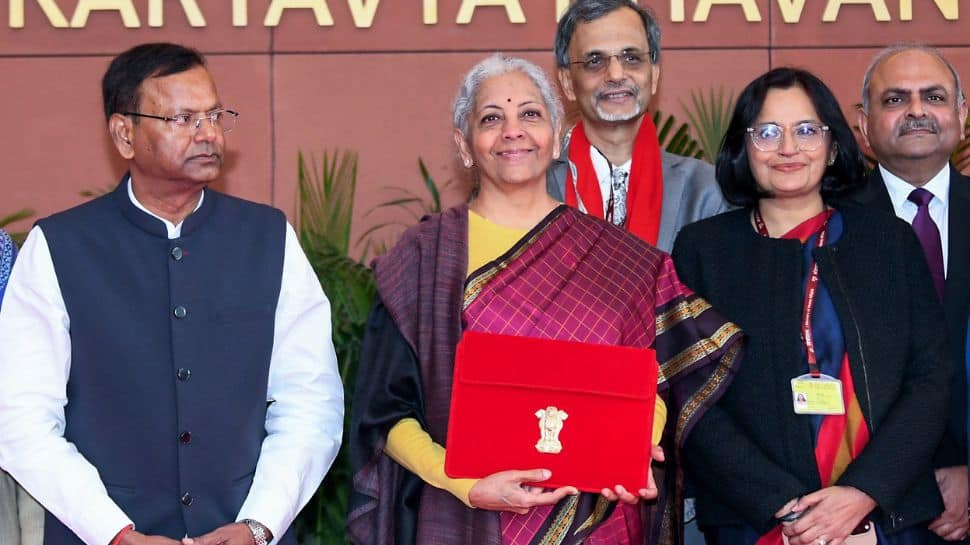
New Delhi: The Cabinet on Sunday approved the Union Budget 2026-27 during a meeting in Parliament chaired by Prime Minister Narendra Modi. A meeting of the Union Cabinet was held at Sansad Bhawan at 10 a.m., and after the Cabinet’s approval, Finance Minister Nirmala Sitharaman proceeded to Parliament to present the Budget.
Earlier, FM Sitharaman met President Droupadi Murmu and offered her a copy of the digital budget. The President also offered ‘dahi-cheeni’ (curd and sugar) to Sitharaman when she arrived at the Rashtrapati Bhavan. The Finance Minister was seen carrying her trademark ‘bahi-khata’, a tablet wrapped in a red-coloured cloth bearing a golden-coloured national emblem on it.
Minister of State for Finance Pankaj Chaudhary, Chief Economic Advisor Dr V. Anantha Nageswaran, Central Board of Direct Taxes (CBDT) Chairman Ravi Agrawal and other officials were seen accompanying the Finance Minister. Sitharaman was set to present her ninth consecutive Union Budget in the Lok Sabha. In 2021, she switched to using a digital tablet to carry the Budget papers, further promoting a modern and eco-friendly approach.
The ‘bahi-khata’ is a red pouch that holds the digital tablet containing the Budget documents. This year, Sitharaman opted for a deep maroon Kanjeevaram saree from Tamil Nadu. The saree featured a deep maroon base with a contrasting border and subtle gold detailing, paired with a yellow blouse.
The Budget is likely to strike a deft balance of sustaining growth momentum and maintaining fiscal consolidation. It also needs to address near-term challenges emanating from unprecedented geopolitical flux, said economists. According to economists, the budget is likely to focus more on capital expenditure, especially in sectors deemed to be strategically important owing to prevailing geopolitical compulsions.
While the FY26 Budget was more tilted towards stimulating middle-class consumption with tax reliefs, the FY27 Budget’s approach to stimulating consumption will be selective, they added.
-

 Business1 week ago
Business1 week agoSuccess Story: This IITian Failed 17 Times Before Building A ₹40,000 Crore Giant
-

 Fashion1 week ago
Fashion1 week agoSouth Korea tilts sourcing towards China as apparel imports shift
-

 Sports5 days ago
Sports5 days agoPSL 11: Local players’ category renewals unveiled ahead of auction
-

 Sports1 week ago
Sports1 week agoWanted Olympian-turned-fugitive Ryan Wedding in custody, sources say
-

 Tech1 week ago
Tech1 week agoStrap One of Our Favorite Action Cameras to Your Helmet or a Floaty
-

 Entertainment1 week ago
Entertainment1 week agoThree dead after suicide blast targets peace committee leader’s home in DI Khan
-

 Tech1 week ago
Tech1 week agoThis Mega Snowstorm Will Be a Test for the US Supply Chain
-

 Sports1 week ago
Sports1 week agoStorylines shaping the 2025-26 men’s college basketball season







